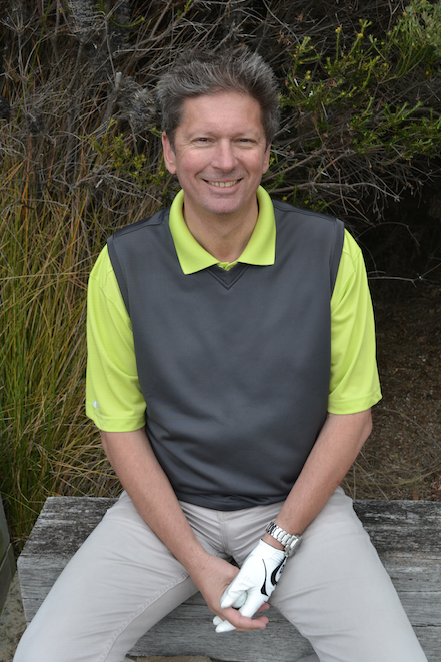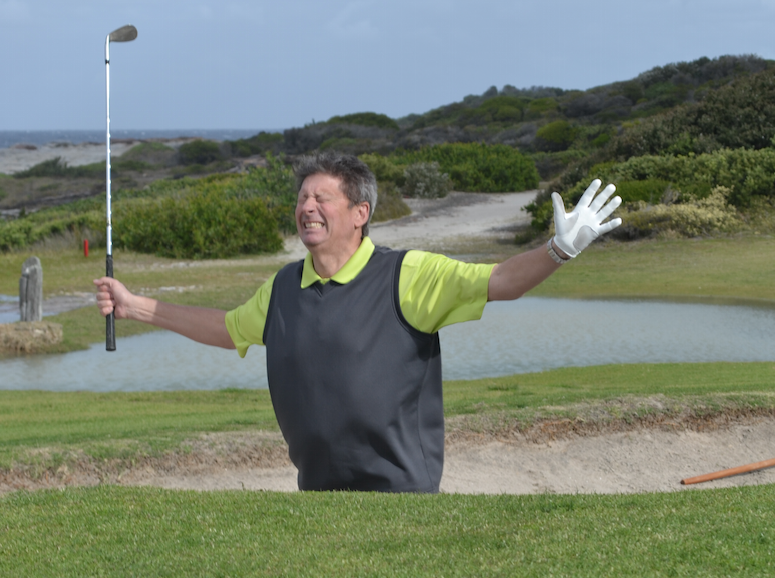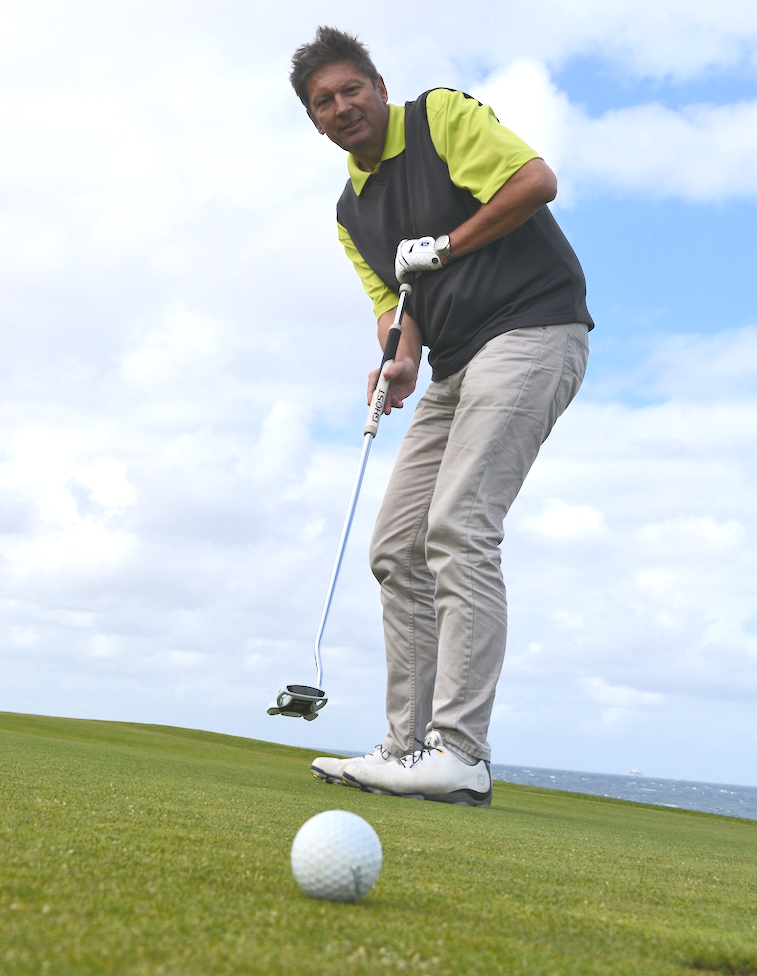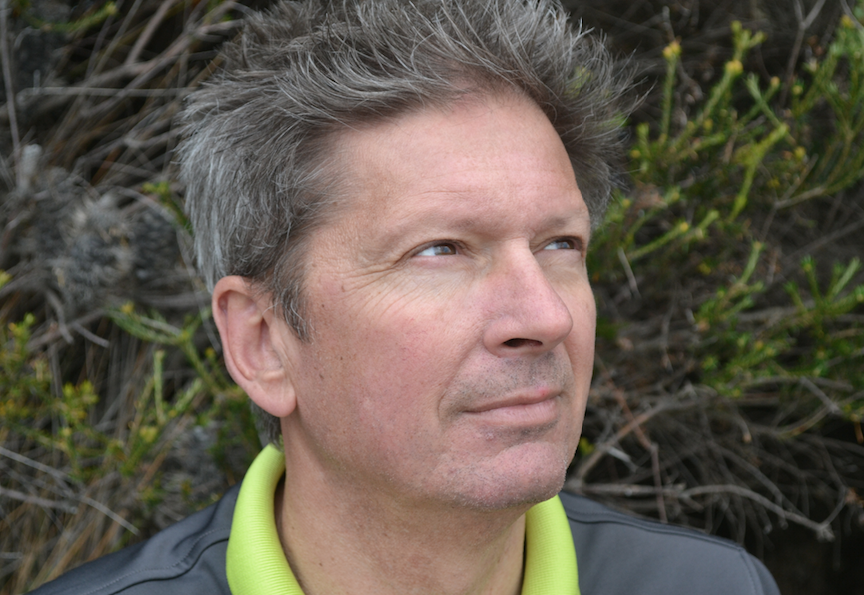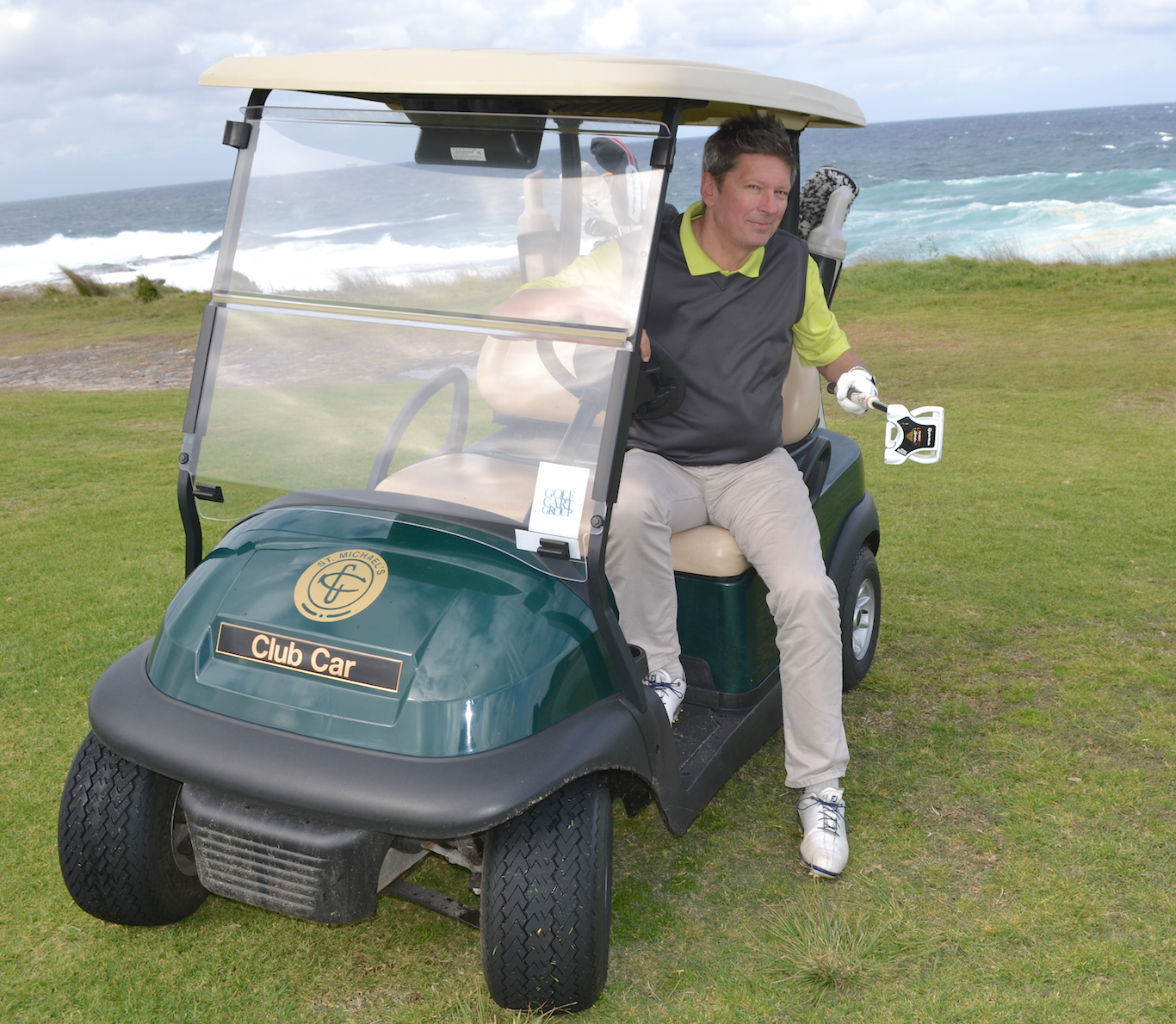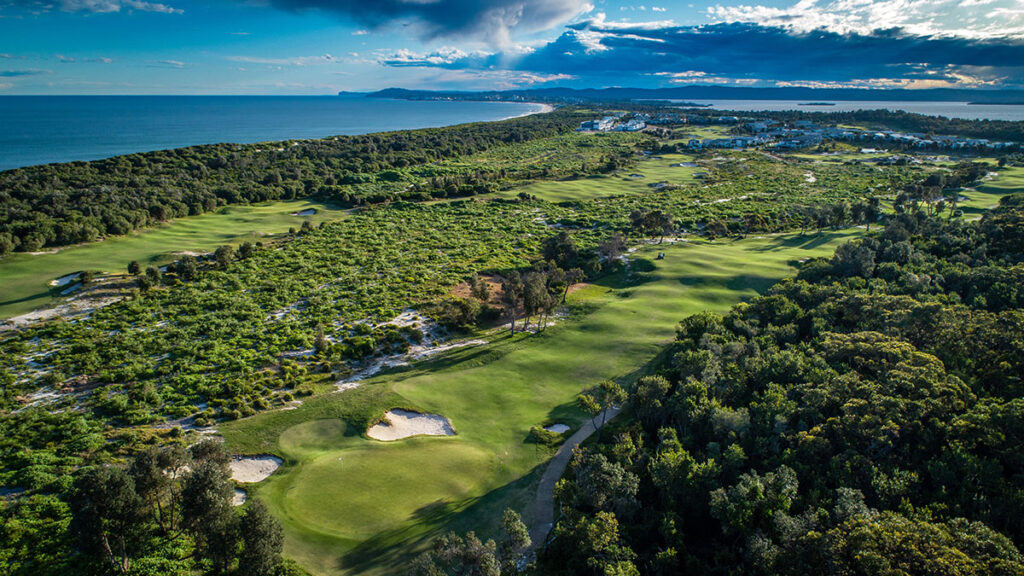▶ ▶ ▶ I would have taken the worst round of my life a thousand times over the day I was diagnosed with Stage 3 colorectal cancer. I didn’t handle it very well at first. I don’t know what I was expecting to be told, but nobody had given me any idea that my situation was as dire as it was. I thought I was meeting the oncologist to map out a chemotherapy plan to clear things up after surgery. I didn’t even have my wife Patty with me. My wonderful sister Susan was there to make sure we had two sets of ears listening to the treatment program being laid out before me. Then, the unthinkable happened – the doctor told us the chances of survival were not good. I immediately went weak at the knees and had to lie down on a bed in his office for a minute or two. It was that big a shock.
▶ ▶ ▶ I feared the worst … but only for a few minutes. Susan centred me over a glass of water and we started to talk through treatment. Hearing the calmness in the professor’s voice was somewhat soothing, but it was – and still is – hard to shake the low survival percentages he rolled out that day. Negative thoughts naturally entered my head and, to a degree, they still do today. I think most people in my situation have struggled going to sleep, thinking about everything from your own funeral to how the family will cope. The secret is accepting that those thoughts are perfectly natural and not to be feared … dealing with them and moving on. There’s been no shortage of private tears along the way – and a few public ones – but that’s OK. From very early in this process I’ve tried to live by my two mantras; “Stay in the Moment” and “This is Not How it Ends”. Hopefully I’m right in believing in both. The support from my family has been amazing – they have helped me a lot just by being there.
▶ ▶ ▶ It’s important to know symptoms when things don’t appear to be normal. In my case I bled when I went to the bathroom in February 2014 and that triggered the colonoscopy. What followed was a bit of a rollercoaster. The initial prognosis was actually good; the scope showed no evidence that the tumour had gone through the wall of the bowel and nor did the scans. The early treatment plan was for surgery, no follow-up treatment and back to work after about a month. From that point on nothing went right for a while. Firstly the tumour was not as easy to access as suggested by the scope. A lot of delicate surgery and scarring meant that I exited surgery with a colostomy bag attached, which was something the surgeon assured me I wouldn’t need going in. This temporary bag was designed to help me heal. The bag was a disaster; it regularly fell off during the day and we tried all manner of tapes and adhesives to try to fix it. There were pastes and glues and three different types of bag, but all failed to stick. I was discharged about 10 days after surgery and told I’d be fine. Unfortunately, or perhaps very fortunately, I developed a twist in the intestine that made me very ill about four days after discharge. I was re-admitted to hospital and a decision was made to operate immediately. I was transferred to St George Private Hospital and the surgery was performed to straighten the intestine. At the same time I’d healed so well that the bag was also removed just on a month after it was fitted. The medical staff was happy with how it went and I recovered in hospital for about eight days. The day before discharge I was sent for scans which were delivered to my room the following day. Patty and I waited for the doctor to discharge me but he was an hour late. We decided to open the scans ourselves. This was the worst moment of all because the scans showed eight (eventually 11) cancers on my liver. With no doctor about, the following 20 minutes were the longest of my life. What followed was 12 months of surgeries and 14 cycles of chemo. The major liver surgery in December 2014 removed more than 75 per cent of my liver, my gall bladder and a bunch of surrounding tissue. The success of this surgery and how I responded to chemo has put me where I am today … still high risk, but alive, happy and cancer-free.
▶ ▶ ▶ I really can’t over-emphasise how much the golf industry in Australia helped me through this, but I do need to start with Club Car. After the tough diagnosis, Club Car President and CEO Marc Dufour flew to Australia to meet me. At a highly emotional lunch down by the harbour he told me that he had to replace me – something I expected and completely understood – but that in no way was Club Car going to walk away from me. I was given as much time off as I needed (it ended up being 10 months) and a new role was created allowing me to focus on Australia, New Zealand and the Pacific Isles without the pressures of extensive travel and broader responsibilities. Subsequently I had visits from senior leaders of our parent company Ingersoll Rand as well as my peers at Club Car who travelled to see me from the USA. Club Car’s reaction to my situation was one I can never fully repay. Regardless of what happens in the future, Club Car stood by me when I needed it most, which now defines the organisation and its leadership.
▶ ▶ ▶ The Australian golf community is just special. I’ll never get to fully use all of the offers of golf and hospitality that were sent my way. There were regular flowers and hampers, phone calls, texts and emails – more tangible and intangible support than I’d ever dreamed of. From my home club at St Michael’s, through the state associations, Golf Management Australia, The PGA of Australia, Golf Australia, the Oatley family and Hamilton Island Enterprises, to the press and electronic media – everyone was on board and helping me.
▶ ▶ ▶ A couple of special moments stand out during my recovery; a video wishing me well from Sam Burgess and Issac Luke of the mighty South Sydney Rabbitohs NRL team, and the constant flow of emails and calls from the industry. At no stage did it let up. In December last year I was recovering from surgery and feeling pretty sorry for myself. We didn’t know the results of pathology and I was in a lot of pain. Lying at home in bed I received a strange text reading “Stay by your phone” followed a couple of minutes later by “Not yet”. Literally 30 seconds after that I received more than 100 well wishes in SMS from golf pros, friends and celebrities at the Jack Newton Celebrity Classic. I literally burst into tears. Peter Van Wegen (CEO of Jack Newton Junior Golf) arranged it during the event’s presentation dinner and I’m so thankful he did and for the way everybody responded. In the days after my initial diagnosis back in April of 2014 I received about 50 emails. While well intentioned, a number of them pretty much had me on the ground. I was struggling to reply to them all without completely breaking down when I had an idea – I could keep everybody up to date and I could help manage the emotions of friends and family via a Facebook page. This was the best thing I did in 2014. At each chemo session I would post a pic while hooked up and summarise the week’s results and treatments. Keeping a positive vibe about the whole thing really helped me and those around me. Attitude is critical and I tend to feed off the energy of others. Golf over the years has introduced me to some wonderful people. I’m a big fan of The Angels and must thank John and Rick Brewster along with Matt Laverty for some great nights out. Brett and Ricky Ogle, Andrew Roper from Wines to the Stars, Kerri-Anne Kennerley, the smooth-swinging Rob Duckworth from Triple M, Mark Ellison, Michael Maguire and all of the South Sydney Rabbitohs along with all of the Golf Management Australia (GMA) and PGA members around the country who helped me. Golf Australia CEO Stephen Pitt and PGA of Australia boss Brian Thorburn have both been great, as has David Allen from GMA. I remember speaking two days before surgery in December at the Australian Golf Writers Awards dinner at The Lakes Golf Club in Sydney. I was so nervous and barely held it together but the genuine love and care in the room was an enormous help as I went into hospital a couple of days later. Experiences like that will stay with me forever.
▶ ▶ ▶ It was tough stepping away from golf while I was recovering. While I had other things on my mind than not being able to get out and play, I still missed it more than I thought I would. I think most people would agree that it’s not always the game we miss, it’s the people we play the game with. St Michael’s Golf Club to me is like “Cheers” … it’s a place where everybody knows my name. Being a third generation and 30-year member, the club has played a huge role in my life. I think now that I’m back playing a little I’m realising just how much I missed the game and the club. My Saturday golf mates are long-term school friends – a number of us mates for more than 40 years. They went through this with me.
▶ ▶ ▶ Facing cancer is a team game and I was lucky to have a very strong team. But even with a strong team, you don’t always win and my heart goes out to a few friends doing it tough right now, especially to the family of late Royal Melbourne Golf Club general manager Paul Rak. The disease is evil and we need to do all we can to help people beat it.
▶ ▶ ▶ It’s a strange thing to say but I think cancer has made me a better person now. It shouldn’t take cancer to do it, but I’m happier in myself, more comfortable in my own skin and I’m far more empathetic than I ever was before. I also don’t fear much now; a difficult business negotiation or disagreement is not as big a deal as it used to be. I’ll never subscribe to living every day like it’s your last, nor am I chipping away at any sort of bucket list – I’m looking forward to the future, staying grounded and living in the moment. But for the ever-present risk of recurrence, it’s a nice place to be.
▶ ▶ ▶ How will it change me as a golfer? I’ll still swear a lot because the game is completely unfair to me and me alone. I get all of the bad bounces. Putts that deserve to go in don’t go in. And I continue to find more obstructed lines, bad lies, divots, spike marks, poorly-designed bunkers, and ill-positioned trees than any other golfer on the planet.
▶ ▶ ▶ I make my living in the business of golf and it would be nice to return to the heady days of single-figure golf. At 51, I need to make the time to practise but more importantly, spend time with a qualified coach to avoid just practising my mistakes. It’ll be nice to get back into playing trade and association days without chopping it around. I had 32 points on Saturday off my 17 handicap – enough to take a dollar or two off the guys I play with, but still nowhere near where I’d like to be. I’ll get there; I just need to make the effort.
▶ ▶ ▶ January’s anchoring ban? Don’t start me! Golf is a game that is difficult to take up and easy to walk away from. Without the long putter, I can barely play – I certainly don’t enjoy myself. I’m weighing up my options and may just end up continuing to use it and disqualifying myself from every event I play in. I play for fun and without my broomstick it won’t be fun. I love watching tennis players hit double-handed backhands with far more power that a single arm can probably generate. Tennis seems to have adapted without the sky falling in. Adam Scott is such a talent and I have no doubt he is already working on a solution, as will some of the other guys who use long or belly putters. There’ll be a bigger impact on the Champions Tour and I’ll be more interested to see what Bernhard Langer does – who knows, he may choose to disqualify himself from every event, too…
▶ ▶ ▶ I really like what golf has already started doing in Australia. We see greater co-operation between associations, which needs to continue. And I see great people like Jack Newton and Eddie Emerson continue to drive growth in junior programs. The work that Eddie is doing with country junior golf is outstanding and deserves greater recognition. At a club level I’m seeing more flexible membership options and increasing engagement with female players. More courses becoming beginner-friendly and more opportunities for social (non-competitive) golf will always help. We’ve never had it so good with TV coverage of our sport. All the world tours are beamed into our lounge rooms. Local stars like Jason Day, Adam Scott, Minjee Lee and Karrie Webb all generate media interest. I also think guys like Rickie Fowler who combines talent with theatre will play a big part. Golf needs excitement to compete with other sports. It’s one of few games where the winning putt can actually be an anti-climax depending on the reaction of the winner. Let’s see a few hats and putters thrown in the air … the game is supposed to be fun.
▶ ▶ ▶ I play golf for fun. If I want exercise, I’ll go for a run. The golf cart has become far more than a mechanism to keep people in the game longer. Don’t get me wrong – a golf cart will absolutely increase a player’s time in the game. But these days, anecdotally, the average age of people hiring carts is actually declining. Many more people have defined fitness regimes and enjoy the experience of playing in a cart. That’s what golf needs to be about – the experience. A cart equipped with Visage GPS, an esky, rain covers and a club and ball cleaner adds to the experience and drives revenue for course operators. According to the National Golf Foundation in the USA, after memberships and green fees, golf carts are the next largest revenue source for golf courses globally. Corporate golf, social golf and member golf are all gravitating towards cart play. As manufacturers we have a role to play in growing the game and we need to provide support to those areas where opportunity exists.
▶ ▶ ▶ It’s time to move on and get back to some form of normality. I’ve just had clear scans and blood tests for the third consecutive time and while nothing is guaranteed in this world, today I’m cancer-free. I’m ready to take my life back and am done with being ‘the guy who had cancer’. There are people out there with real battles on their hands and families under enormous stress. We need to reach out and support these people who are all around us. I’ve been lucky; I responded very well to chemotherapy and three talented surgeons were able to remove what chemo couldn’t address. This may or may not be over forever, but it is over for now. I can’t thank friends, family and industry people enough for helping Patty and I get through this. Now, I just want to go back to saying, “Hi, I’m Kevin Gates from Club Car” for a while.

